| Construction Rating: | starstarstarstarstar_border |
| Flight Rating: | starstarstarstarstar_border |
| Overall Rating: | starstarstarstarstar_border |
| Published: | 2010-01-03 |
| Diameter: | 1.35 inches |
| Length: | 25.04 inches |
| Manufacturer: | Sunward Aerospace  |
| Skill Level: | 2 |
This is my second Sunward kit, the first being a more complicated rocket, the Phoenix, and now the CFX-3. This one is not complicated and is Sunward's simple 4 Fins and a Nose Cone (4FNC) entry level rocket. They promote this one for schools by selling it in bulk.
This rocket is called the CFX-3. Not sure what it means. But it also says, "the formula for fun". It uses Sunward's typical canopy-type nose cone, flies on 18mm motors, and recovers on an 18" parachute. Sunward rates the kit a skill level 2 and calls it a "great beginners kit".
 The rocket kit includes an 18" main body tube that is 1.35" in diameter. This tube is sturdy and is 1/32" thick. It also includes the 18mm motor mount that is made up of the motor tube, two large paper centering rings, a thrust ring and an L-screw motor retainer. There are four laser-cut balsa fins, cardstock fin-tabs and the canopy-type plastic nose cone. The recovery system includes an 18" parachute, which needs assembly, and 32" of ¼" flat-elastic shock cord. Lastly, along with instructions, there are some peel-n-stick decals.
The rocket kit includes an 18" main body tube that is 1.35" in diameter. This tube is sturdy and is 1/32" thick. It also includes the 18mm motor mount that is made up of the motor tube, two large paper centering rings, a thrust ring and an L-screw motor retainer. There are four laser-cut balsa fins, cardstock fin-tabs and the canopy-type plastic nose cone. The recovery system includes an 18" parachute, which needs assembly, and 32" of ¼" flat-elastic shock cord. Lastly, along with instructions, there are some peel-n-stick decals.
CONSTRUCTION:
The instructions are printed on 7 pages of 8½ x 11" paper. They include illustrations for every step. They are written in English and French. They also include instructions to perform a swing-test. A Fin Marking Guide and the 3-Fold Paper Mount are built into the instruction pages, which are cut out when needed. With this second kit, I feel that Sunward has a good standard for instructions being thorough and easy to follow.
Since the built of this 4FNC rocket is so straightforward, I'm only going to outline a couple of areas of concern and interest.
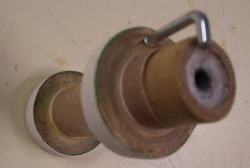 Again, because this is now my second Sunward kit, I have to comment on the motor mount. It is made up of the 18mm motor tube and two very large paper centering rings. As opposed to Kelo's build of the Desert Storm (pictured to the right), Sunward now provides centering rings with pre-drilled holes for the L-screw. The fit of one of my centering rings was loose on the motor mount tube. The motor mount also includes a thrust ring. I have come to really like this motor mount.
Again, because this is now my second Sunward kit, I have to comment on the motor mount. It is made up of the 18mm motor tube and two very large paper centering rings. As opposed to Kelo's build of the Desert Storm (pictured to the right), Sunward now provides centering rings with pre-drilled holes for the L-screw. The fit of one of my centering rings was loose on the motor mount tube. The motor mount also includes a thrust ring. I have come to really like this motor mount.
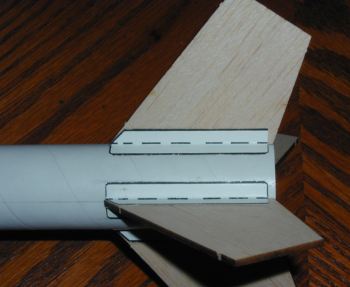 Next the tube is marked with the marking guide and the fins are prepared to be attached. The fin tabs are cut out of a provided template made of card stock. These are then glued to the left and right sides of the each balsa fin. My fin tabs were a little longer than the fins, so I trimmed them all before attaching them to the fins (you can see where I trimmed them in the picture at the bottom edge of the fin). Once the fin tabs are attached and dry, they are spread (like wings) and the fins are attached to the body tube. Using the technique with wood (or white) glue, allows the fins to stay in place really fast. No alignment jig needed with this technique!
Next the tube is marked with the marking guide and the fins are prepared to be attached. The fin tabs are cut out of a provided template made of card stock. These are then glued to the left and right sides of the each balsa fin. My fin tabs were a little longer than the fins, so I trimmed them all before attaching them to the fins (you can see where I trimmed them in the picture at the bottom edge of the fin). Once the fin tabs are attached and dry, they are spread (like wings) and the fins are attached to the body tube. Using the technique with wood (or white) glue, allows the fins to stay in place really fast. No alignment jig needed with this technique!
The bare elastic band is attached to the body tube using a 3-fold paper method. It is then tied to the nose cone. The parachute is assembled (cut the shroud lines into 3 equal parts, cut out the parachute, attach stick-on round reinforcements, tie the shroud lines to the 'chute) and then attached to the nose cone. I choose to cut out the center of the parachute to make a large spill hole. I did this because I felt and 18" parachute for this size of rocket was too large. I also added a swivel to attach the parachute to the nose cone.
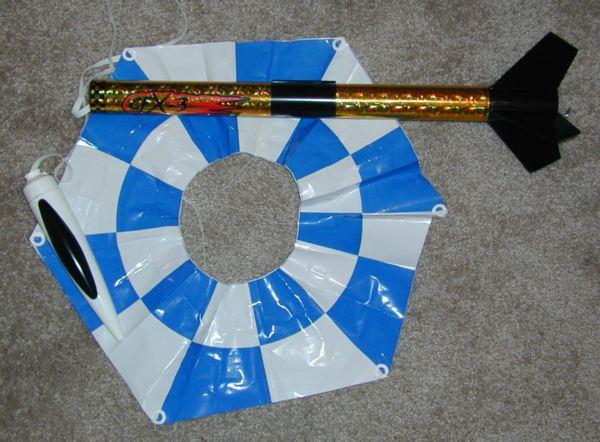
 I finished the rocket by first using several coats of Plasti-Kote Primer. I followed the exact advice from Sunward (note this is not in their instructions): "It is particularly important that the nose cones be THOROUGHLY sanded with extra-fine grit sand paper before painting. The cones are made of High Density Polyethylene, which tends to be waxy. Sanding this off before painting assures that the paint doesn't peel." I then painted the entire rocket with some Krylon Gloss Black. After drying, I masked off the canopy and painted the nose cone with Walmart White (using very, very light coats so as not to react with the Krylon). I then used Book Covers, etc. Prismatic Gold Book Cover. After that I applied the CFX-3 Flame decal, the checkerboard sticker and the BCN-YA (be seeing you) sticker. I think it made for a nice looking rocket.
I finished the rocket by first using several coats of Plasti-Kote Primer. I followed the exact advice from Sunward (note this is not in their instructions): "It is particularly important that the nose cones be THOROUGHLY sanded with extra-fine grit sand paper before painting. The cones are made of High Density Polyethylene, which tends to be waxy. Sanding this off before painting assures that the paint doesn't peel." I then painted the entire rocket with some Krylon Gloss Black. After drying, I masked off the canopy and painted the nose cone with Walmart White (using very, very light coats so as not to react with the Krylon). I then used Book Covers, etc. Prismatic Gold Book Cover. After that I applied the CFX-3 Flame decal, the checkerboard sticker and the BCN-YA (be seeing you) sticker. I think it made for a nice looking rocket.
Overall, for CONSTRUCTION I would rate this kit 4 ½ points. It is an easy rocket to build but I'm disappointed in the fin tabs not fitting properly. Yes, it was easily fixed, so ultimately, it was no problem.
FLIGHT/RECOVERY:
Sunward recommends the B4-4 (first flight), B6-4, C6-5 or the C6-7.
My CFX-3's finished weight was 2.9 ounces. I have created a RockSIM to give you an idea of altitudes. Sunward indicates flights to 700 feet.

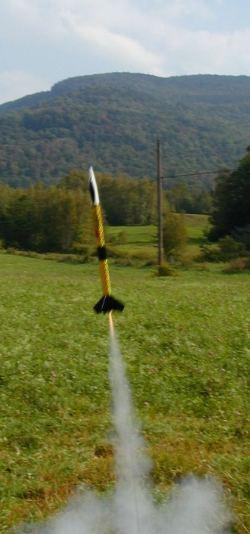 WARNING: My RockSIM is created in 7.01. It crashes when going into 3D mode because of that canopy I created on the nose cone.
WARNING: My RockSIM is created in 7.01. It crashes when going into 3D mode because of that canopy I created on the nose cone.
Flight preparation requires wadding. This size of tube took 5 sheets of Estes wadding to feel comfortable. After that a motor is installed and the L-screw is turned to hold the motor in place. I have been very pleased with this type of motor retention. I now have 9 flights (4 on the CFX-3 and 5 on the Phoenix) and have not had a single problem with retention.
My first flight was on an A8-3. It was straight and stable and low altitude.
I then moved the B6-4. It too was a very nice flight being straight off the pad with ejection occurring just after apogee. I'm glad I cut the center out of the parachute. This provides for a very stable (not swinging back and forth) and good descent rate for this rocket. I'd encourage Sunward to add that to their instructions.
Next flight, following the progression, was on a C6-5. This flight was much higher and interestingly the 5 second delay was good. I had thought perhaps a 7 would be needed.
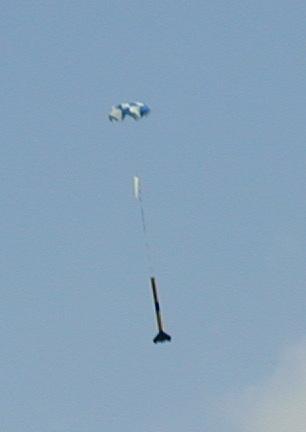 So how about this bare elastic shock cord? I expressed concern during my Phoenix review about the 3-fold paper mount and bare elastic shock cord. Well, I'm pleased to say with 9 flights on the two models, it is holding up very well. Perhaps even better than the cloth covered elastic. Maybe we're on to something here. Don't skimp on the wadding though.
So how about this bare elastic shock cord? I expressed concern during my Phoenix review about the 3-fold paper mount and bare elastic shock cord. Well, I'm pleased to say with 9 flights on the two models, it is holding up very well. Perhaps even better than the cloth covered elastic. Maybe we're on to something here. Don't skimp on the wadding though.
For FLIGHT/RECOVERY, I would rate this rocket 4 ½ points. The parachute is too big for this rocket. Everything else is perfect.
I give the rocket an OVERALL rating of 4 ½ points. This is a good 4FNC rocket for the beginners graduating up from an Estes E2X kit. The canopy nose cone sets it apart from other standard xFNC kits and it has some nice decals as well.
Other Reviews
- Sunward Aerospace CFX-3 By Chan Stevens
Brief: This is the little brother of the CFX-Six Footer that I've previously reviewed. This is a nice and easy 4FNC rocket with Sunward's unusual canopied nose cone. It is easy to build and flies great. Construction: Nick's review covered the materials and instructions very thoroughly. I'll confirm that over two years later (and after a change in ownership), the kit still ...
 |
 |
Flights
 |
 |